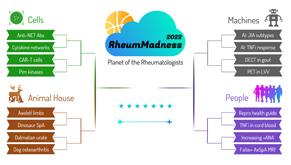NETs haven’t been this popular since 1993 when Michael Jordan, a University of North Carolina graduate considered the best basketball player ever, popularized the phrase “nothing but NET[osis].” Just like Jordan, we’re confident our nets will entrap the other teams—including our first-round competitor, Cytokine Networks—and we will prevail.
Leah Bettner, MD, is a second-year rheumatology fellow in the University of North Carolina Rheumatology Fellowship Program.
Shruti Chandramouli, MD, is a second-year rheumatology fellow in the University of North Carolina Rheumatology Fellowship Program.
Christopher Overton, MD, is a second-year rheumatology fellow in the University of North Carolina Rheumatology Fellowship Program.
Astia Allenzara, MD, is a first-year rheumatology fellow in the University of North Carolina Rheumatology Fellowship Program.
Michael Cunningham, MD, is a first-year rheumatology fellow in the University of North Carolina Rheumatology Fellowship Program.
Luis Palomino, MD, is a first-year rheumatology fellow in the University of North Carolina Rheumatology Fellowship Program.
References
- Zuo Y, Yalavarthi S, Gockman K, et al. Anti-neutrophil extracellular trap antibodies and impaired neutrophil extracellular trap degradation in antiphospholipid syndrome. Arthritis Rheumatol. 2020 Dec;72(12):2130–2135.
Sources
- Zuo Y, Yalavarthi S, Gockman K, et al. Anti-neutrophil extracellular trap antibodies and impaired neutrophil extracellular trap degradation in antiphospholipid syndrome. Arthritis Rheumatol. 2020 Dec;72(12):2130–2135.
- de Bont CM, Stokman MEM, Faas P, et al. Autoantibodies to neutrophil extracellular traps represent a potential serological biomarker in rheumatoid arthritis. J Autoimmun. 2020 Sep;113:102484.
- He Y, Yang FY, Sun EW. Neutrophil extracellular traps in autoimmune diseases. Chin Med J (Engl). 2018 Jul 5;131(13):1513–1519.
- Yipp BG, Kubes P. NETosis: How vital is it? Blood. 2013 Oct 17;122(16):2784–2794.
 Experience All of RheumMadness
Experience All of RheumMadness
During RheumMadness, rheumatology concepts represent teams that compete against each other in a tournament, much like basketball teams do in the NCAA’s March Madness tournament. In a series for The Rheumatologist, readers will get a chance to read the scouting reports. Check out the reports from each region:
Region: Cells
Region: Animal House
Region: Machines
Region: People
